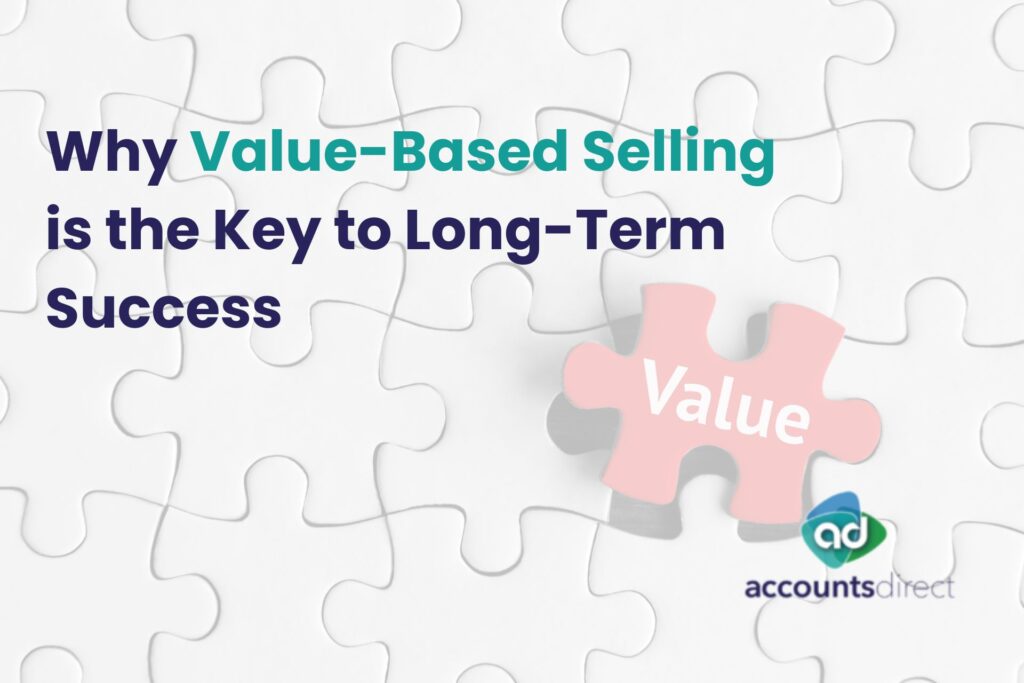Value based selling has emerged as a key strategy to make or break a company’s long-term success. Simply put, value based selling is positioning a product or service based on the value it provides to the customer rather than its features or price. This approach shifts the focus from pushing products to understanding and fulfilling customers’ needs, resulting in improved sales, increased customer satisfaction, and stronger customer relationships. In this blog post, we will delve deeper into value based selling and discuss why it is the key to long-term success in sales.
What is Value Based Selling?
Value based selling is a customer-centric approach to sales that focuses on understanding the customer’s pain points, needs, and desired outcomes and positioning the product or service as the solution that adds value to their business. This approach starkly contrasts the traditional product-centric sales approach, which emphasises the product’s features, price, and competitive advantage.
In value based selling, the salesperson acts as a consultant or trusted advisor rather than a mere vendor. This involves actively listening to the customer, understanding their business goals and challenges, and using that information to position the product or service as a valuable solution that meets their needs. It also requires building strong customer relationships and continuously adding value to those relationships by providing useful insights, industry knowledge, and support.
The Benefits of Value Based Selling
-
Improved Sales Performance
Value based selling has been proven to improve sales performance significantly. By understanding the customer’s needs and challenges, salespeople can position the product or service as a solution tailored to meet their specific requirements. This makes selling easier and increases the chances of winning the deal. When customers see the value in the product or service, they are willing to pay a premium price. As a result, organisations can improve their profit margins and achieve higher sales revenues.
-
Strong Customer Relationships
The customer is at the centre of the sales process. By understanding and meeting the customer’s needs, salespeople can build strong and trusting relationships with them. This helps in creating customer loyalty and repeat business. When customers feel valued and supported, they are more likely to be long-term customers and recommend the company’s products or services to others.
-
Increased Customer Satisfaction
Value based selling focuses on delivering real value to customers. When customers see the tangible results and benefits of the product or service, they are more satisfied and happy with their decision to buy from the company. This creates a positive experience for the customer and strengthens their trust in the company and its offerings.
-
Better Differentiation
In today’s competitive marketplace, it can be challenging for companies to differentiate themselves from their competitors. However, with this, the focus is on the value delivered rather than price or features. This allows companies to stand out and position themselves as unique and superior in the eyes of the customer. As a result, they are less likely to face pricing pressure or lose deals to competitors solely based on price.
-
Long-Term Success
Value based selling is not a quick fix or a short-term sales tactic. It is a long-term approach to building strong and lasting relationships with customers by understanding and fulfilling their needs. Companies that implement value based selling as a core part of their sales strategy are likely to see sustained success and continued growth in the long run.
Implementing Value Based Selling in Your Sales Strategy
-
Shift the Focus from Products to Customers
The first step in implementing value based selling is to shift the focus from the product or service to the customer. Sales teams must understand the customer’s business, their goals, and challenges to position the product as a valuable solution.
-
Understand the Value Proposition
To effectively sell a product or service’s value, sales teams must first understand its value proposition. This involves identifying the product’s unique selling points and benefits and how they align with the customer’s needs and goals.
-
Ask the Right Questions
Value based selling requires active listening and asking the right questions. Sales teams must engage in meaningful conversations with customers to understand their needs and pain points. This helps in tailoring the solution to meet their specific requirements.
-
Support and Add Value
To maintain strong customer relationships and reinforce the product or service’s value, sales teams must continue to support and add value by providing relevant insights, industry knowledge, and support.
Conclusion
Value based selling is not just another sales technique. It is a customer-centric approach that requires a shift in mindset and a focus on understanding and fulfilling customers’ needs. By implementing this strategy, organisations can improve their sales performance and revenues and build long-lasting relationships with satisfied and loyal customers. The old saying goes, “When you focus on creating value for others, you ultimately create value for yourself.” Therefore, it is safe to say that this is the key to long-term success in sales.

